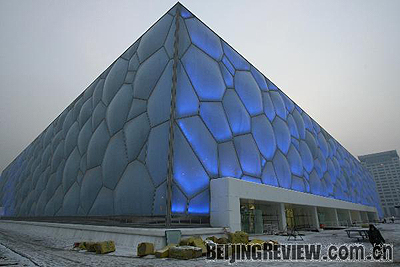|

Government leaders around the world have voiced their support for the upcoming Beijing Olympic Games with less than six months to go before the widely anticipated event. According to initial arrangements, leaders of more than 60 countries, including representatives of royal families, will attend the Olympics, according to the Beijing Organizing Committee for the Games of the XXIX Olympiad.
Despite calls by various organizations, individuals and nongovernmental groups to boycott the Olympics because they disagree with some of China's internal and international policies, no government leaders have agreed to do so.
U.S. President George W. Bush, who accepted the Chinese Government's invitation to attend the games in August, said he would not use the Olympics to highlight political issues.
"I'm going to the Olympics," Bush said in an interview with the BBC on February 14. "I view the Olympics as a sporting event."
Bush also said he would not use the Olympics as an opportunity to express his opinions to Chinese citizens in a public way. Instead, he could always address hotly contested issues, such as the Darfur conflict in Sudan, with Chinese leaders, he added.
China attaches great importance to the Darfur issue and has played a positive and constructive role in properly resolving the issue, said Liu Jianchao, Spokesman of the Ministry of Foreign Affairs of China, at a regular press conference on February 14.
"We have noticed recent discussions and acts on China's stance on the Darfur issue. According to my knowledge, some are out of the concerns over the situation there, but others tried to link the issue with China's policy on Sudan and the Beijing Olympic Games," Liu said. "It is understandable if they do not understand the Chinese Government's policy on Darfur. But if they have political objectives, we will not accept that."
While wishing the Beijing Olympics a success, German Chancellor Angela Merkel told a reception for foreign correspondents in Germany on February 18 that the Beijing Olympic Games would offer a significant opportunity for China, because more people will be able to get to know and understand the country through the event.
In a telephone conversation with Chinese Premier Wen Jiabao on February 19, British Prime Minister Gordon Brown expressed his appreciation for China's positive efforts aimed at resolving the Darfur issue. Britain stands against boycotting the Olympics, he said.
Prince Charles of Britain said the Beijing Olympics are an important event while meeting visiting Chinese State Councilor Tang Jiaxuan on February 19. He said he looked forward to exchanges between Britain and China in the field of Olympics. London will host the 30th Olympiad in 2012.
China is firmly opposed to any attempts to politicize the Olympic Games. It believes that the Olympics are a sports gala for people around the world and that it is their common aspiration to see a successful Olympics in Beijing. Some organizations' attempts to play up topics such as Darfur and human rights and link them with the Olympic Games to bespatter China's image and exert pressure on China "violate the Olympic spirit and principles and are doomed to failure," said the Chinese Foreign Ministry.
Jacques Rogge, President of the International Olympic Committee (IOC), also said his organization is "a sporting, not a political association." It was not for the IOC to play a political role, he told broadcaster France 24 on February 15, adding he did not expect a boycott of the summer Olympics in Beijing.
"I do not fear a boycott because most statesmen well know that boycotts only punish those doing the boycotting," Rogge said. He stressed that people should not call on the IOC to solve the world's problems. Athletes trying to use the event as a political stage would be punished, he warned.
| 